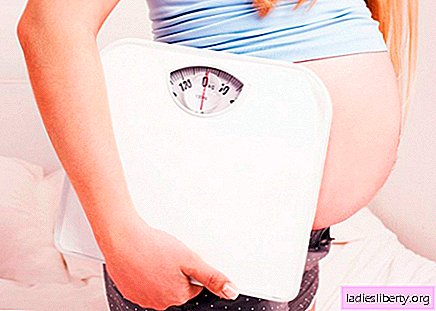
Many expectant mothers are sure that pregnancy is the time when you can finally relax and stop fighting with round shapes, entering into an unequal battle with fresh pastries. And really - who will appreciate a flat tummy or a wasp waist, if these achievements of fitness and constant self-control are replaced by rounded sides and loose robes that hide the stout silhouette? But why are people in white coats taking weight gain so harshly? After all, scales are almost the first thing that meets us on the threshold of the obstetrician-gynecologist's office in the antenatal clinic.
Weight gain during pregnancy is the subject of special attention of your attending physician, and not by chance. It is a uniform increase in kilograms that indicates that everything is in order with the mother and baby, and pregnancy is proceeding normally. To understand what parameters a specialist evaluates by weight, one should know how the weight of a future mother is formed.
Some mistakenly attribute the extra pounds to the child himself, but this, of course, is not so. The baby himself weighs very little almost the entire first half of pregnancy, starting an intensive set of grams only from the second trimester. And the average weight of a newborn usually ranges from 3 to 3, 5 kilograms - not so much, considering that normally a pregnant woman adds about 8 to 10 kilograms at the time of delivery.
The weight of a pregnant woman is the sum of:
- General increase in blood volume;
- Breast growth;
- Uterine enlargement;
- Amniotic fluid;
- The weight of the fetus.
It is these grams and kilograms that your doctor considers, correlating the weight of a pregnant woman during examination with indicators of special tables. Why is pregnant weight control so important? In the early stages of doctors, weight loss associated with severe toxicosis can alert you. If nausea and vomiting are so strong that they interfere with obtaining the necessary calories and vitamins, this is an alarming symptom that requires medical attention. Severe toxicosis is not a normal condition, so if your body rejects any food and kilograms melt, be sure to seek help.
First trimester toxicosis goes away, leaving an awakened appetite instead. On the one hand, it’s wonderful, but on the other hand, the prospect of leaving the walls of the hospital with the same figure as in the last months of pregnancy is not very attractive. However, it should be borne in mind that the doctor is not worried about sweet buns and extra chocolates. A sharp weight gain in the second half of pregnancy can talk about edema. For this reason, control weighing is carried out weekly, and indicators are carefully checked against previous data. You will have to take the diet proposed by a specialist very seriously - after all, by using some products, a pregnant woman loads the kidneys, which already work in an intensive mode. Therefore, salty, spicy, smoked is better to exclude from the diet in advance, and in the presence of edema - forget about these products for a certain period. Normally, the weight should be added in the second and third trimester gradually, in proportion to the growth of your baby, and closer to the birth the arrow of the scales usually freezes. Sometimes the expectant mother even loses 1-2 kilograms. This is not necessary to be afraid - after all, the baby is gaining the main weight by the 38th week, and following a diet or taking decongestants eliminates excess fluid from the body.











